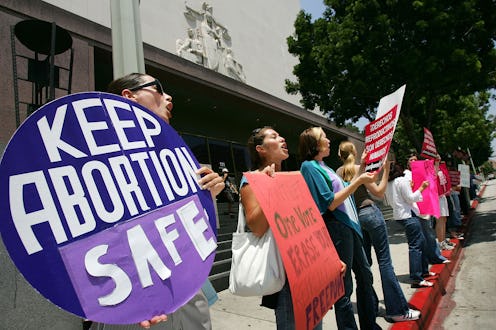News
How To Talk About Abortion Later In Pregnancy, Because There’s A Lot Of Misinformation

In recent weeks, Republicans across the country have expressed outrage over so-called "late-term abortions." During his State of the Union address, President Trump went as far as to suggest that lawmakers in New York and Virginia, who have been working to make the procedure more accessible, are actually trying to enable abortions up until the moment a person gives birth. However, advocates explain to Bustle that "late-term abortions" are a misleading term used by abortion opponents to spread misinformation.
According to Dr. Jennifer Conti, a fellow with advocacy group Physicians for Reproductive Health, "late-term abortion" is "not an actual term that has any clinical or scientific meaning." Conti says that the term avoids specifying a time period in which the abortion procedure is performed, whereas physicians divide pregnancies into trimesters rather than terms.
"Really what makes the most sense in terms of thinking about when we provide abortions is this idea of viability," Conti explains, noting that the idea of a "late-term abortion" is therefore also medically inaccurate. "That term is very specifically crafted to incite a very visceral negative feeling to really play on people’s emotions, and instead of referring to a finite period within the pregnancy, it specifically leaves it very big so that you don’t know the difference between second trimester and all the way up until the baby is being delivered at term," she says.
As Conti points out, legislators in New York and Virginia — as well as in a few other states — are trying to protect people who might require abortions later in pregnancy, especially in the event that the Supreme Court overturns Roe v. Wade. They are also trying to make abortion more accessible later in pregnancy in two very specific cases: if the fetus is not expected to survive outside the womb, or if the pregnant person's mental or physical health is at risk.
"So when you see people needing abortions later on in pregnancy — meaning beyond 24 weeks or beyond the time we most commonly think of as viability — it’s often one of these two scenarios," Conti says. She adds that people who get abortions later in pregnancy typically only "end the pregnancy because of some horrific news" they receive about their health or the life of their child, and not because they decide that they no longer want to be pregnant.
Anti-abortion lawmakers have zeroed in on legislation in two particular states in recent weeks: New York's Reproductive Health Act, which ensures that people are able to obtain abortions after 24 weeks if their health is at risk or the fetus is not viable, and codifies reproductive health care access in case Roe v. Wade is overturned; and a proposed bill in Virginia that would remove barriers to allow people to make a decision about abortion later in pregnancy with a medical professional.
Both pieces of legislation have been repeatedly described as "late-term abortion" bills, a term that Trump used in his State of the Union as well. In a statement to Bustle, Planned Parenthood President Dr. Leana Wen calls Trump's remarks on abortion in his Tuesday speech “inaccurate and deliberately misleading."
Moreover, an open letter signed by dozens of "later abortion patients and their partners" made it clear that the right's "late-term abortion" narrative does not represent those who have had the procedure later in their pregnancies.
“Our cases, the ones that would be affected by the legislation in question, constitute a relatively small number of abortions," the letter, which was part of an initiative facilitated by New York RHA patient advocates, states. "So while these cases are incredibly rare and specific to each patient’s unique circumstances, they are being broadly misrepresented and are playing an outsized role on the national stage.”
Destiny Lopez, the co-director of All* Above All, suggests that the outrage over so-called "late-term abortions" is rooted in the "stigma attached to women who need abortions later in pregnancy." However, Lopez tells Bustle that the GOP's "inflammatory misrepresentation" of legislation in New York and Virginia — while "heinous" — actually serves as a distraction from a real and ongoing concern: the barriers to access that many people face when they are seeking an abortion, such as clinic closures, waiting periods, and insurance restrictions.
"That decision about when to have an abortion should be in between a woman and her medical provider and what we really should be talking about are all of the barriers a woman could face that might prevent her from getting the abortion as early as she wants," Lopez says. "This impacts low-income people and people of color disproportionately, and that's the conversation we should really be having."
This article has been updated.